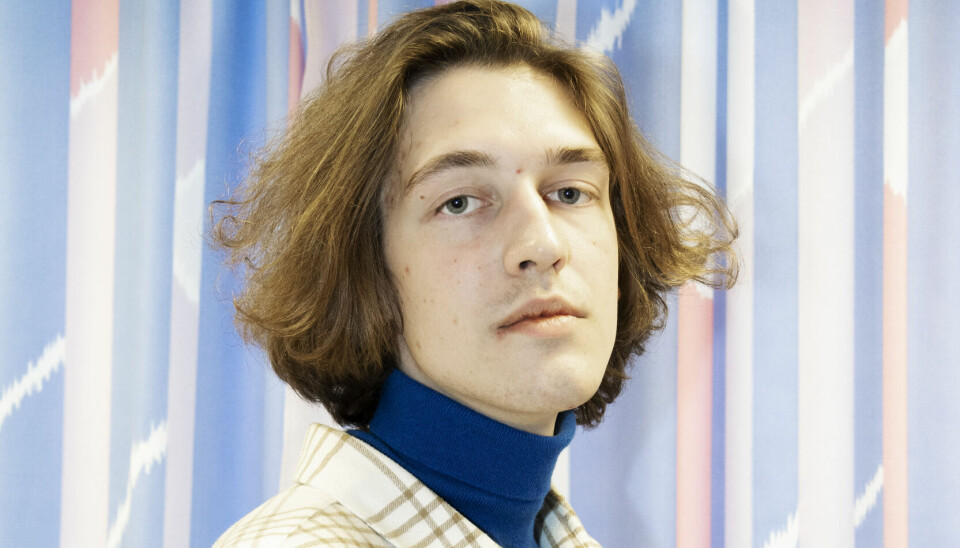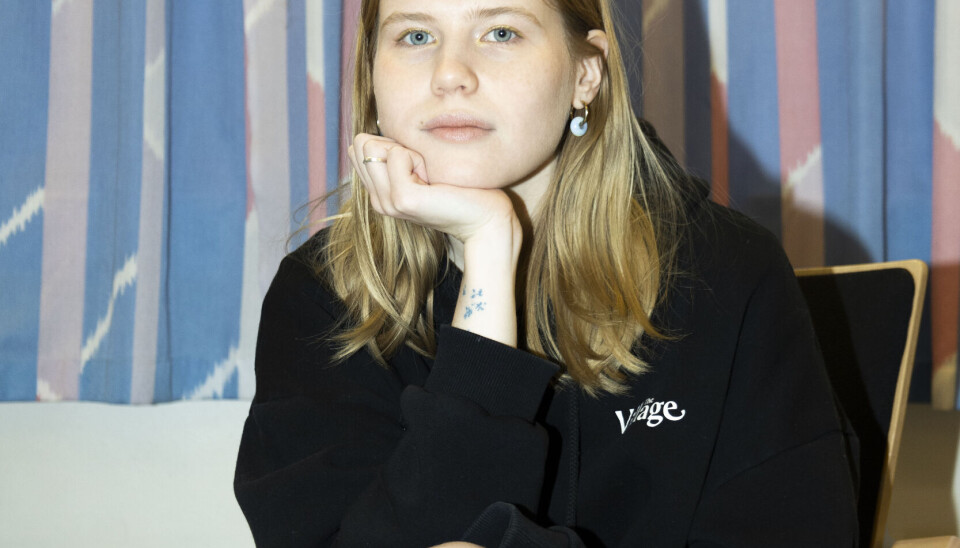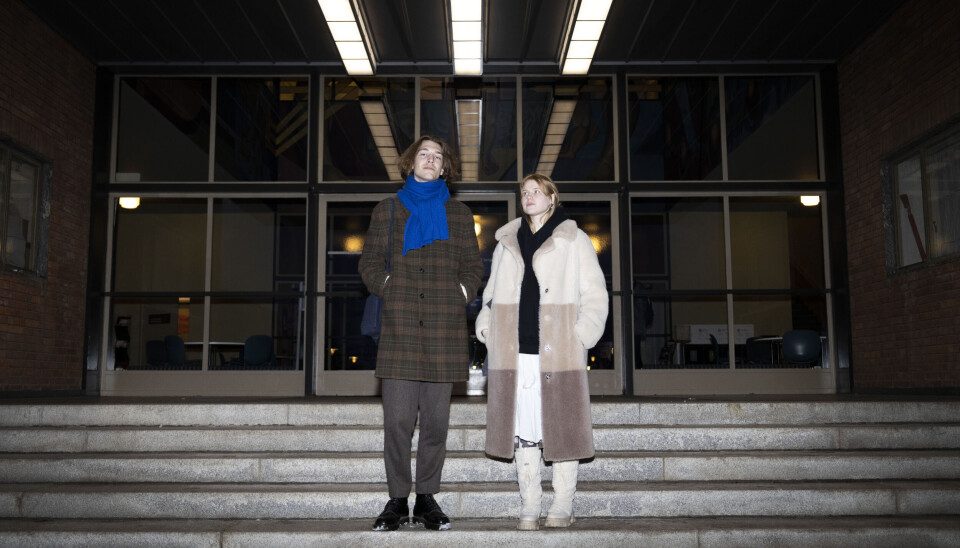
Student Newspaper Forced to Flee Russia:
They Risk Being Labelled As Extremists
This is a translation of the Norwegian article written by Alida de Lange D’Agostino, with photographs by Synne Moen (published in Universitas on February 8, 2023).
They started out as a completely normal student newspaper in Moscow, but now Doxa is one of the leading independent media platforms in Russia.
— I never expected it to go this far. It scares me, says Alexandra Guliaeva.
— Now the authorities are contemplating categorising us as an extremist group, explain Nikita Kuchinsky and Aleksandra Guliaeva as they visit Universitas’ locale at Blindern (on campus at UiO).
Both of them, at just 22 years old, have had to leave behind their families and friends in Russia because it has become dangerous running Doxa in their home country. Now they may never get the chance to go home again.
The word Doxa springs from ancient Greek meaning “opinion” or “belief” and coincides with the aims of the online newspaper. In 2017, the paper was established by a group of students at Moscow’s Higher School of Economics (HSE).
The ambition was to give students an outlet to speak about academics, but the newspaper suddenly took on a more significant meaning. From writing about philosophy and sociology to becoming a platform to discuss, amongst other subjects, police violence and widespread sexual assault on Campus.
— Professors would develop relationships with their students, and no one had written about this previously. It was natural for Doxa to take up the subject, says Kuchinsky. According to him, the university has now established routines about how to handle such sexual harassment. It was Doxas first breakthrough before things took a darker turn back in 2019.
Threatened by the university
Throughout the 2019 elections of the legislative assembly (the state Duma) in Moscow, Doxa presented support to the students who participated in the opposition protests against the authorities. The opposition came in due to the fact that the authorities had refused to register several independent candidates before the local elections. Among the protesters were various students and professors, and the university did not like that.
— The dean was a candidate in the election, and Doxa criticised her. Then, to put pressure on us and the protesters, the university threatened expulsion, says Kuchinsky.

He follows by telling Universitas that multiple students were arrested and that the Editorial board started collecting money to pay their fines. In addition to this, they started liberation campaigns and published the names of those imprisoned in an attempt to protect them from police violence.
— Students in Russia are met with a lot of political opposition. It was around that time that we realised that we were more than just a student newspaper.
In consequence to their criticism of the dean, the authorities and their clear support for imprisoned protesters, the university would no longer fund them — nor be associated with them. But the worst was yet to come.
More than just a student newspaper
In 2021, four of Doxa's founders were attacked in their homes, they were subjected to physical violence and put under house arrest. This took place after they published a video online stating that it is illegal for universities to punish students for participating in protests.
— My partner is one of the four founders. I spent a whole year with him in a room while he was under house arrest,” says Guliaeva and adds: “We got married in that room on December 13th during the year he was under house arrest, because 1312 is the numerical code for ‘all cops are bastards’.
They have since fled Russia. Now the editorial members write in exile — from various places around the world. Some of the journalists are still in their home country and write anonymously. Several of the sources are also anonymous.
Kuchinsky deems this as completely necessary due to the drastic press censorship.
—The use of anonymity is important for journalism in several authoritarian regimes. In Russia, you can face serious consequences for calling the war against Ukraine a war. You can be fined, imprisoned or interrogated for standing out, he says.
Just like Doxa, all the other independent media platforms are blocked in Russia. But by using Telegram and VPN, they still reach several hundred thousand people. But now it is not just student affairs that are on Doxa’s agenda.
— We can hardly be called a student newspaper anymore, the majority of the subjects they write about are in connection to the war in Ukraine.
They also cover several international issues that they believe readers in Russia do not get a hold of from the other media. For example, about the protests in Iran, Uzbekistan, and Tajikistan.

— We also try to write about positive news. Slovenia recently legalised same-sex marriage. We hope that it can give hope.
Kuchinsky believes that Doxa has become one of the leading independent media outlets in Russia. Nevertheless, his and Guliaeva’s futures remain unforeseeable.
Feeling useless
At the end of last year, Russian politician Vasily Piskaryov demanded that prosecutors should recognize Doxa as an extremist organisation. If he gets his way, the Doxa journalists could, among other things, risk up to 15 years in prison.
— I never expected it to go this far. It scares me. My parents are still in Russia, and everything I do can have consequences for them, says Guliaeva.
The feeling of homesickness comes often, and now there is a chance that she will never get to return home.
— I called my mum and said that I was scared. She said that she is proud of me and that what I am doing is important.
Guliaeva has often doubted whether she will continue to write for Doxa. Originally, she wanted to become a film critic.
— I feel that my job is useless. What can a text do? Soon the war will have lasted a year, and nothing has changed because of a text, she says.
— My job is useless,’ that’s a good headline, chimes in Kuchinsky from the side.
He feels safest outside of Russia and does not think that it will be like coming home if he returns. But like Guliaeva, the motivation for writing has fluctuated.

He has reflected on what is the goal of working as a journalist in an authoritarian regime. He does not think they have the power to potentially influence the authorities or the ongoing situation. He believes that Doxa has another important role to play.
— The most important thing we can do is support people. There are many who are against the war. We can support the Ukrainians, the political prisoners, and the minority groups who have to live under this regime. LGBTQ+ and trans people, for example. It is important that we write articles for them, he says.
Awarded the Students' Peace Prize
Despite the fear and the uncertainty, both journalists have chosen to continue with their work. Doxa recently won the 2023 Students' Peace Prize (Studentenes fredspris (SPP)), and has come to Norway to accept it.
The Students' Peace Prize is awarded in collaboration with several Norwegian student organisations.
— They are awarded the prize for their brave work in exposing corruption and sexual harassment at universities, documenting state persecution, as well as fighting against disinformation from the authorities, as stated in the press release.
— It is an honour to be given this prize, and we are very grateful.This validates our work and gives us a boost, says Kuchinsky.
During their short stay in Norway, they have already managed to participate in panel discussions, interviews, and meetings. Both are pleasantly surprised by the interest they have been met with. They hope to write more cases in English in the future in order to reach an even wider audience.
— It is important for us to use our platform to convey our most important message. The democratisation of Russia cannot happen without Ukraine winning the war, says Kuchinsky and adds:
— We do not see ourselves as heroes. But maybe what we do can lead to a change. We hope so.

































